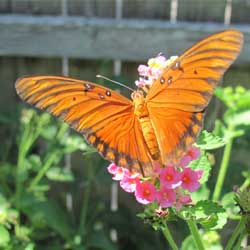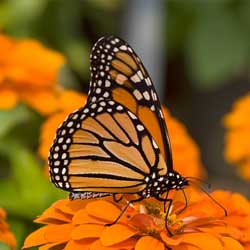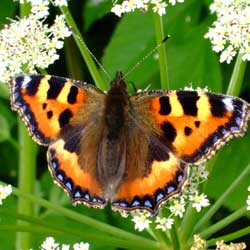Bringing Butterflies to the Backyard
Bringing Butterflies to the Backyard
In spring, female butterflies will be mostly concerned with finding their species’ specific host plants on which to lay fertilized eggs. Instinctively, they know they must find plants to ensure that their caterpillars will have appropriate food for survival after hatching. Both male and female butterflies will be looking for flowers with nectar for their own survival. And, they will be searching for shelter from rainy or windy weather, a sunny place for basking, and a source of water. Because many natural butterfly habitats in North America are disappearing at an alarming rate, it is becoming increasingly difficult for butterflies to find these necessities of life.
Starting a butterfly garden can be simple and rewarding if you follow these pointers. The most important thing you can do as a gardener is to plant both nectar and host plants in your garden. Providing host plants for caterpillars to feed on, will allow you to watch the metamorphosis from caterpillar to chrysalis to butterfly. So, do not discourage caterpillars. They may make your garden plants look bad but it’s usually only temporary. Most important – do not use pesticides! You may be killing off the very insects you made the garden for. And, you don’t have to have a large area to get a response. Just a few select plants will spur some action. Choose the sunniest spot possible for your butterfly garden. It could be any size or shape; even a short border will work. A combination of woody shrubs, perennials and annual flowers works best, but using just a couple of plants can still yield results. Planting a section of wildflowers is an easy way to cover a problem area and lure some butterflies to your yard. If you don’t have the room for a garden, fuchsia, petunia or impatiens hanging baskets will attract butterflies as well as hummingbirds.
The following is a list of plants that attract butterflies:

Woody shrubs:
- Butterfly Bush (Buddleja)
- Deutzia (Deutzia)
- Glossy Abelia (Abelia)
- Japanese Privet (Ligustrum)
- Lilac (Syringa)
- Spirea (Spiraea)
- Weigela (Weigela)

Vines:
- Honeysuckle (Lonicera)
- Trumpet vine (Campsis)
Perennials:
- Aster (Aster)
- Butterfly Weed (Asclepias)
- Carnation (Dianthus)
- Coneflower (Echinacea)
- False Sunflower (Heliopsis)
- Joe-Pye weed (Eutrochium)
- Shasta Daisy (Leucanthemum)
- Yarrow (Achillea)
Annuals & Perennials:
- Allysum (Lobularia)
- Balsam (Impatiens)
- Cosmos (Cosmos)
- Dahlia (Dahlia)
- Fuchsia (Fuchsia)
- Geranium (Pelargonium)
- Heliotrope (Heliotropium)
- Lantana (Lantana)
- Marigold (Tagetes)
- Petunia (Petunia)
- Portulaca (Portulaca)
- Salvia (Salvia)
- Snapdragon (Antirrhinum)
- Vinca (Catharanthus)
- Zinnia (Zinnia)













